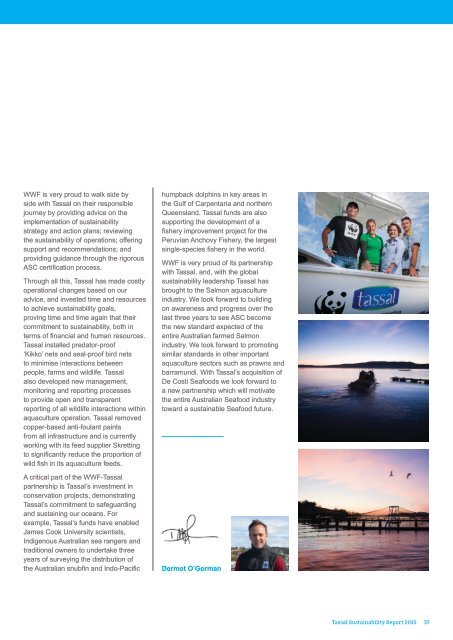SUSTAINABILITY REPORT 2015
kbiQcx
kbiQcx
You also want an ePaper? Increase the reach of your titles
YUMPU automatically turns print PDFs into web optimized ePapers that Google loves.
WWF is very proud to walk side by<br />
side with Tassal on their responsible<br />
journey by providing advice on the<br />
implementation of sustainability<br />
strategy and action plans; reviewing<br />
the sustainability of operations; offering<br />
support and recommendations; and<br />
providing guidance through the rigorous<br />
ASC certification process.<br />
Through all this, Tassal has made costly<br />
operational changes based on our<br />
advice, and invested time and resources<br />
to achieve sustainability goals,<br />
proving time and time again that their<br />
commitment to sustainability, both in<br />
terms of financial and human resources.<br />
Tassal installed predator-proof<br />
‘Kikko’ nets and seal-proof bird nets<br />
to minimise interactions between<br />
people, farms and wildlife. Tassal<br />
also developed new management,<br />
monitoring and reporting processes<br />
to provide open and transparent<br />
reporting of all wildlife interactions within<br />
aquaculture operation. Tassal removed<br />
copper-based anti-foulant paints<br />
from all infrastructure and is currently<br />
working with its feed supplier Skretting<br />
to significantly reduce the proportion of<br />
wild fish in its aquaculture feeds.<br />
A critical part of the WWF-Tassal<br />
partnership is Tassal’s investment in<br />
conservation projects, demonstrating<br />
Tassal’s commitment to safeguarding<br />
and sustaining our oceans. For<br />
example, Tassal’s funds have enabled<br />
James Cook University scientists,<br />
Indigenous Australian sea rangers and<br />
traditional owners to undertake three<br />
years of surveying the distribution of<br />
the Australian snubfin and Indo-Pacific<br />
humpback dolphins in key areas in<br />
the Gulf of Carpentaria and northern<br />
Queensland. Tassal funds are also<br />
supporting the development of a<br />
fishery improvement project for the<br />
Peruvian Anchovy Fishery, the largest<br />
single-species fishery in the world.<br />
WWF is very proud of its partnership<br />
with Tassal, and, with the global<br />
sustainability leadership Tassal has<br />
brought to the Salmon aquaculture<br />
industry. We look forward to building<br />
on awareness and progress over the<br />
last three years to see ASC become<br />
the new standard expected of the<br />
entire Australian farmed Salmon<br />
industry. We look forward to promoting<br />
similar standards in other important<br />
aquaculture sectors such as prawns and<br />
barramundi. With Tassal’s acquisition of<br />
De Costi Seafoods we look forward to<br />
a new partnership which will motivate<br />
the entire Australian Seafood industry<br />
toward a sustainable Seafood future.<br />
—————————<br />
Dermot O’Gorman<br />
Tassal Sustainability Report <strong>2015</strong> 37


